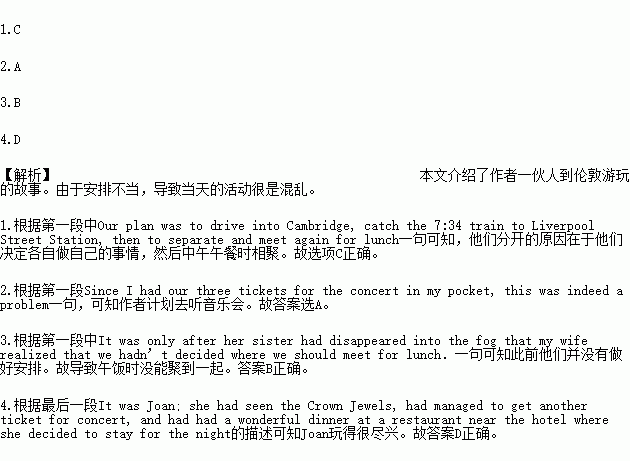题目内容
Our plan was to drive into Cambridge, catch the 7:34 train to Liverpool Street Station, then to separate and meet again for lunch.We should have arrived at Liverpool at 9:19, but due to a typical London fog, the train had to move along so slowly that it was not until 10:30 that it got there.In spite of our late arrival, Joan, my wife’s sister, decided that she would go to see the Crown Jewels in the Tower of London while we went shopping.It was only after her sister had disappeared into the fog that my wife realized that we hadn’t decided where we should meet for lunch.Since I had our three tickets for the concert in my pocket, this was indeed a problem.There seemed to be nothing we could do except taking a taxi to the Tower of London, and try to find her there.Needless to say, we didn’t find her.
It was now one o’clock, and the concert began at 2:30.“Perhaps she will think of waiting outside the concert hall,” suggested my wife hopefully.By this time the fog was so thick that road traffic had to stop, and the only way to get there was by underground railway.Hand in hand we felt our way along the road to where we thought the nearest station should be.An hour later we were still trying to find it.Just as I was about to lose my temper completely when we met a blind man tapping his way confidently through the fog.With his help we found Tower Hill tube station just fifty yards down the road.
By now it was far too late even to try to get to the concert hall before the performance began at 2:30, so we decided to return to Cambridge.It took seven long hours instead of the usual two to make that journey.Nor were we able to get any food and drink on the train.Tired and hungry we finally reached home at ten, opening the door to the sound of the telephone bell.It was Joan; she had seen the Crown Jewels, had managed to get another ticket for concert, and had had a wonderful dinner at a restaurant near the hotel where she decided to stay for the night.Now she was ringing to discover whether we had had an equally successful day.
1.Why was Joan separated from her sister and her brother-in-law?
A. they could not see each other because of the fog.
B. Joan had not seen Crown Jewels.
C. They planned to do different things until lunch time.
D. The writer didn’t want to go to the concert.
2.What did the writer plan to do in the afternoon?
A. Go to the concert.
B. See the Crown Jewels.
C. Return to Cambridge.
D. Go shopping.
3.The reason why they didn’t all meet for lunch was that _______.
A. They lost their way in the fog
B. they forgot to make necessary arrangement
C. they waited at different places and didn’t meet each other
D. the couple couldn’t find the underground station
4.It’s quite clear that for Joan the trip to London had been ________.
A. spilt by the fog
B. quite tiring
C. rather disappointing
D. very enjoyable

